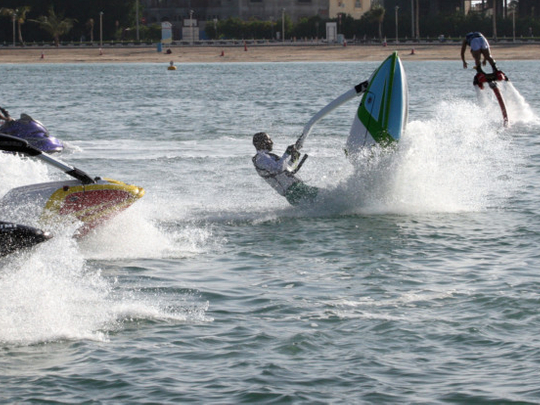
Dubai: New hand-held gun radars will now be used to catch speeding watercraft such as jet skis and boats near the Dubai coastline.
The new speed limits — ranging from 5-7 knots depending on the location — will not apply to vessels navigating deeper Gulf waters offshore.
Dubai Police and Dubai Maritime City Authority (DMCA) announced the new radars as well as launched a new awareness campaign urging marine vessels to abide by designated speed limits across Dubai waters in a joint press conference on Tuesday.
Navigating at a speed exceeding the maximum speed allowed in limited speed areas risks a fine of Dh2,000, according to the law.
This includes jet skis, speedboats, yachts, floating restaurants, and any sea vessel.
Major General Khamis Mattar Al Mazeina, Dubai Police Chief, said that enforcing the new speed limits will significantly cut down on the number of accidents caused by speeding watercraft in areas close to the beach.
“The speed limit will ensure the safety of the public who are enjoying Dubai’s beaches or any establishments near the beach, as those accidents can cause loss of lives and damage to public property.” Maj Gen Al Mazeina explained.
In 2014, there were 56 accidents involving watercraft, Dubai Police Statistics showed.
He said the radar gun has been used in trials and caught 200 speeding watercraft, adding that recently they had received multiple complaints from beach goers about jet-ski users who drive close to the beach in a dangerous manner,
Maritime police patrols will also be intensified to enforce the new speed limit.
The maximum speed limit is determined based on operating conditions and local safety measures, and the speed is measured in knots.
Maj Gen Al Mazeina said that the speed limit of five knots is to be complied with in the ports of Dubai, while a speed limit of seven knots should be abided by within Dubai Creek and Al Mamzar.
In the case of entering within 300 metres of the beach area, which should only be done in the case of an emergency, a speed limit of seven knots is to be abided by.
A speed of seven knots should also be observed when passing within 50 metres of any boat moorage, diving platform, loading dock, ship moorage or when passing through an anchoring area of small marine vessels.
Maj Gen Al Mazeina, praised the DMCA’s vital role in introducing several maritime safety initiatives which have had a positive impact on the image of Dubai’s maritime sector.
Dubai Police recently signed a Memorandum of Understanding with DMCA to improve shore security by conducting daily night and day patrols to ensure seamless operation of marine vessel anchorages.
Sultan Bin Sulayem, Chairman of Dubai Maritime City Authority, said that determining speed limits across Dubai waters complements DMCA’s ongoing efforts to implement the highest standards of maritime safety and operational management in line with the best practices and in compliance with local and international decisions.
He added that the speed limits do not apply to the open sea.
“We are also working on ensuring that all water vessels, no matter how small, are registered with the authority,” he added.
The DMCA had earlier launched a campaign for licensing unregistered personal watercraft.











